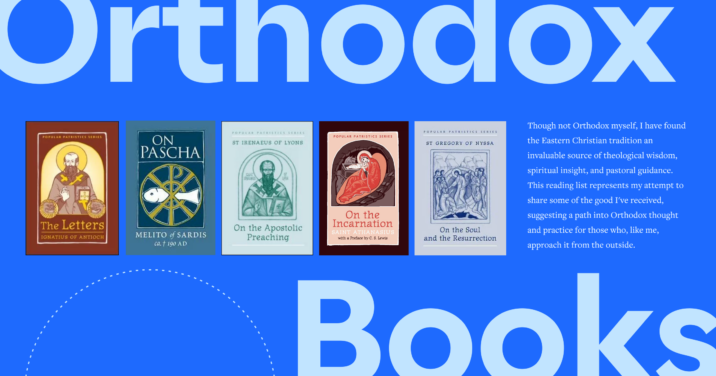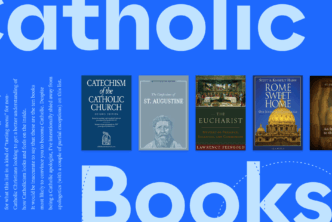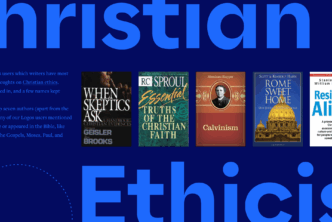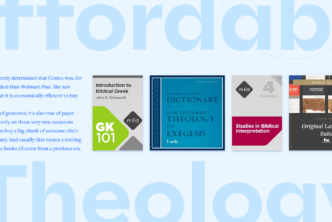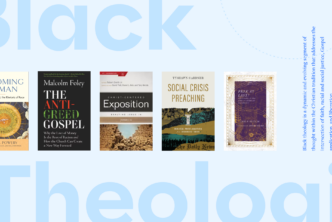Though not Orthodox myself, I have found the Eastern Christian tradition an invaluable source of theological wisdom, spiritual insight, and pastoral guidance. This reading list represents my attempt to share some of the good I’ve received, suggesting a path into Orthodox thought and practice for those who, like me, approach it from the outside.
At its heart, Orthodox theology weaves together dogmatic truth, mystical experience, and monastic wisdom. The tradition insists that true theology is never merely scholarly but is instead a way of life rooted in worship, energized by prayer, and oriented to the transfiguration of person, community, and cosmos into a final, total oneness with God. This integration is evident from the earliest writings and continues to shape Orthodox life today.
I’ve organized this guide into four sections. First, I suggest a few of the foundational texts from the first millennium of Christian thought, works that represent both the defining issues of the first churches and the great centers of earliest Christianity— Jerusalem, Antioch, Rome, Alexandria, and Constantinople. Next, I lay out a handful of “modern classics” that have helped bridge East and West, making Orthodox insights accessible to an ecumenical audience. For those seeking an introduction to Orthodox thought, the third section offers reliable guides to the tradition. Finally, I conclude with a few recent scholarly works that I have found especially instructive and stimulating.
A word on approaching these texts: Those wholly new to Orthodox theology might wish to start with one of the introductions before diving into the foundational texts. The modern classics offer another accessible entry point, perhaps especially Clément’s Roots of Christian Mysticism or Schmemann’s For the Life of the World. The scholarly works can be read alongside the ancient texts, providing context and guides for interpretation.
Table of contents
Foundational texts: the classical Orthodox tradition
These works from Christianity’s first millennium helped to establish the theological, spiritual, and liturgical foundations of Orthodox and, indeed, all Christian thought. They demonstrate the tradition’s remarkable integration of doctrine, mysticism, and pastoral concern.
1. Ignatius of Antioch, Letters
Composed while en route to his martyrdom in early second-century Rome, Ignatius’s letters offer our earliest window into post-apostolic Christianity. Ignatius’s passionate defense of church unity, his rich eucharistic theology, and his understanding of episcopal authority would profoundly shape Orthodox ecclesiology. His insistence that true Christianity must be embodied in concrete communities, centered on the Eucharist and united around their bishop, remains challenging today. The letters also demonstrate how early Christians understood martyrdom as a form of liturgical worship.
2. Melito of Sardis, On Pascha
This dramatic paschal homily, probably delivered around AD 170, exemplifies how early Christians read Scripture and celebrated their liturgical mysteries. Through sophisticated typological interpretation, Melito shows how the Exodus narrative finds its fulfillment in Christ, while his poetic style demonstrates the integration of theology and worship characteristic of Orthodox thought. The work provides our earliest surviving Christian paschal homily and shows how the celebration of Easter shaped Christian understanding of salvation history. Its dramatic style and theological depth continue to influence Orthodox paschal celebrations.
On Pascha: With the Fragments of Melito and Other Material Related to the Quartodecimans (Popular Patristics Series)
Regular price: $10.99
3. Irenaeus of Lyons, On the Apostolic Preaching
This catechetical work by one of the faith’s most important early theologians presents a comprehensive vision of salvation history centered on Christ. Writing against Gnostic interpretations that would separate the Old Testament from the New, Irenaeus demonstrates the profound unity of Scripture and tradition. His understanding of creation, incarnation, and human destiny as “recapitulation” in Christ remains foundational for Orthodox theology. The work shows how careful doctrinal teaching serves pastoral ends, helping believers understand their place in God’s unfolding plan of salvation.
4. Athanasius of Alexandria, On the Incarnation
A foundational text, written while its author was a young deacon, shows how the incarnation addresses the fundamental human problem of death and corruption, restoring humanity to communion with God. Athanasius’s emphasis on deification—that “God became human so that humans might become divine”—remains central to Orthodox soteriology. The work’s accessible style (it was written for a convert) and theological depth make it an excellent introduction to Orthodox understanding of salvation.
5. Gregory of Nyssa, On the Soul and the Resurrection
This dialogue presents Gregory’s conversation with his dying sister Macrina (Gregory calls her “the Teacher”) and addresses perennial questions about human nature, bodily resurrection, and universal salvation with philosophical rigor and mystical insight. The work demonstrates how Orthodox theology could engage with philosophy while maintaining its distinctively Christian concern and focus. Macrina’s role as a teacher also shows the importance of women’s wisdom in the early church and the formation of the theological tradition.
6. Gregory of Nazianzus, Festal Orations
These masterful sermons by “the Theologian” (one of only three figures in Orthodox tradition to receive this title) show how doctrine emerges from and returns to worship. Delivered on major feast days in Constantinople, they combine exquisite rhetorical skill with profound theological insight, especially regarding the Trinity and the incarnation. Gregory’s ability to express complex theological truths in language that moves both heart and mind exemplifies the Orthodox understanding of theology as doxology.
7. Ephrem the Syrian, Hymns on Paradise
These remarkable hymns not only show poetry as theology and theology as poetry but also represent the distinctively Syriac contribution to Orthodox theology, where poetry serves as the primary vehicle for theological expression. Ephrem’s meditations on paradise and the garden of Eden explore multiple levels of meaning in Scripture, showing how biblical narratives illuminate the spiritual journey and sacramental life. His use of feminine imagery for the Holy Spirit and his understanding of nature as God’s second Bible deeply influenced Eastern Christian thought.
8. Mark the Monk, Counsels on the Spiritual Life
These practical spiritual teachings from a fifth-century monastic writer demonstrate how Orthodox theology translates into daily spiritual practice. Mark’s emphasis on the relationship between grace and human effort, his insights into the nature of temptation and spiritual warfare, and his guidance on prayer and inner vigilance have made this work a classic of Orthodox spirituality. His teaching that “the kingdom of heaven is within you” and his practical methods for cultivating inner awareness remain valuable for contemporary spiritual seekers.
Counsels on the Spiritual Life, Volumes 1 and 2 (Popular Patristics Series)
Regular price: $14.99
9. John Climacus, The Ladder of Divine Ascent
This influential spiritual manual, traditionally read in Orthodox monasteries during Lent, presents the Christian life as a thirty-step ladder of spiritual progress. Though written primarily for monks, its detailed analysis of virtues and vices, its psychological insights, and its practical wisdom have made it beloved by lay readers for centuries. Climacus combines stark realism about human weakness with profound hope in divine grace, offering concrete guidance for the spiritual journey while maintaining that true knowledge of God comes only through direct experience.
10–11. Maximus the Confessor, Two Hundred Chapters on Theology and On the Cosmic Mystery of Jesus Christ
These works mark the summit of Byzantine theological synthesis and creativity, integrating Christian philosophy, biblical exegesis, and liturgical mysticism into a comprehensive vision centered on the cosmic significance of the incarnation. Maximus shows how Christ’s assumption of human nature transforms all creation, making possible the deification of humanity and the entire cosmos. His sophisticated understanding of human nature, freedom, and destiny continues to engage contemporary thinkers, while his liturgical theology remains fundamental to Orthodox worship. Though challenging, these texts reward careful study with profound insights into the relationship between God, humanity, and creation.
Two Hundred Chapters on Theology: Text (Popular Patristics Series)
Regular price: $14.99
On the Cosmic Mystery of Jesus Christ: Selected Writings from St Maximus the Confessor (Popular Patristics Series)
Regular price: $9.99
12. John of Damascus, On the Orthodox Faith
A synthetic and systematic summary of Christian doctrine that proved foundational for future Christian teachings, this work was composed near Jerusalem in the early eighth century by a Syrian monk and scholar, clarifying confusions about the Trinity, Christology, sacramentality, and the veneration of icons, saints, and relics, as well as challenging popular false teachings.
On the Orthodox Faith: Volume 3 of the Fount of Knowledge (Popular Patristics Series)
Regular price: $15.99
13. Symeon the New Theologian, On the Mystical Life
A remarkably original exploration of personal spiritual experience composed in Constantinople around AD 1000, stressing the necessity of direct, transformative encounter with the Holy Spirit. Symeon insists that true knowledge of God is necessarily experiential, acquired through repentance, asceticism, and divine illumination.
On the Mystical Life: The Ethical Discourses, Volumes 1–3 (Popular Patristics Series)
Regular price: $38.99

Living voices: modern Orthodox classics
These works have helped bridge East and West, making Orthodox insights accessible to the broader Christian world while demonstrating the tradition’s continuing vitality.
14–15. Sergius Bulgakov, The Comforter and The Burning Bush: On the Orthodox Veneration of the Mother of God
These two masterworks by one of modern Orthodoxy’s most creative modern thinkers showcase the tradition’s capacity for theological innovation while remaining rooted in patristic sources. The Comforter offers a wide-ranging theology of the Holy Spirit that connects pneumatology with ecclesiology, creation, and human destiny. The Burning Bush presents a profound meditation on Mary that illuminates Orthodox understanding of creation, incarnation, and deification, while engaging thoughtfully with Catholic and Protestant perspectives. Though occasionally controversial, Bulgakov’s work demonstrates how Orthodox theology can speak to contemporary questions while maintaining its distinctive voice.
16. Paul Evdokimov, The Sacrament of Love: The Nuptial Mystery in the Light of the Orthodox Tradition
A rich theology of marriage that develops an Orthodox theology of human sexuality that remains deeply relevant today. Evdokimov shows how the mystery of human love reflects and participates in divine love, drawing on liturgical texts, patristic sources, and his experience as a lay theologian and father. His treatment of gender, embodiment, and spiritual transformation offers a compelling alternative to both secular and conservative Christian approaches to these topics.
17. Vladimir Lossky, The Mystical Theology of the Eastern Church
Arguably the most influential Orthodox theological work of the twentieth century, Lossky’s masterpiece demonstrates how doctrine and mystical experience are inseparably linked in Eastern Christian thought. Writing for a Western audience, he articulates key Orthodox themes—the unknowability of God, the distinction between essence and energies, the meaning of deification—with remarkable clarity while showing their interconnectedness. The work remains essential for understanding how Orthodox theology differs from Western approaches while sharing common Christian foundations.
18. Alexander Schmemann, For the Life of the World: Sacraments and Orthodoxy
This small but revolutionary book has become one of Orthodoxy’s most effective bridges to the wider world. Schmemann shows how the Orthodox liturgical vision transforms our entire understanding of creation, time, and human purpose. His critique of “religion” in favor of the gospel’s transformation of all life has influenced theologians across denominational lines. The work demonstrates how Orthodox sacramental theology offers a powerful alternative to both secularism and religious fundamentalism.
19. Mother Maria Skobtsova, Essential Writings
These powerful writings from a remarkable figure—artist, poet, nun, and eventually martyr in Ravensbrück concentration camp—demonstrate how Orthodox spirituality naturally leads to radical social engagement. Mother Maria’s theological vision, forged in the crucible of the Russian emigration in Paris and resistance to Nazism, challenges any division between liturgical life and service to the poor. Her essays on the Orthodox understanding of person, community, and freedom remain startlingly relevant for contemporary social questions.
20. Elisabeth Behr-Sigel, The Place of the Heart: An Introduction to Orthodox Spirituality
A luminous introduction to Orthodox spirituality that is both deeply traditional and creatively engaged with modern questions. Behr-Sigel shows how the Orthodox emphasis on the heart as the center of spiritual life speaks to contemporary psychological insights, while giving special attention to women’s voices and experience within the tradition. Her work demonstrates how Orthodox spirituality can be authentically lived in Western cultural contexts.
21. Kallistos Ware, The Orthodox Way
A beloved work by one of Orthodoxy’s most effective ambassadors presents the Orthodox faith not as a system of beliefs but as a path of spiritual transformation. With characteristic clarity and warmth, Metropolitan Kallistos guides readers through the major themes of Orthodox theology—God as mystery, the meaning of creation, the human person as image of God, the way of salvation—while showing how these truths are meant to be lived. His ability to combine scholarly precision with spiritual wisdom has made this book an indispensable guide for countless seekers.
Pathways in: introductions to Orthodox Christianity
These works offer systematic introductions to Orthodox theology, spirituality, and practice, providing essential orientation for those new to the tradition.
22. Olivier Clément, The Roots of Christian Mysticism: Texts from the Patristic Era with Commentary
This carefully curated sourcebook combines primary texts from the patristic tradition with thoughtful commentary that helps modern readers enter into their spiritual world. Clément, a convert to Orthodoxy from secular humanism, is particularly attuned to the questions of contemporary seekers. His selections and commentary demonstrate how patristic approaches to prayer, Scripture, and spiritual life can address modern spiritual needs without simplifying the tradition’s complexity.
The Roots of Christian Mysticism: Texts from the Patristic Era with Commentary, 2nd Edition
Regular price: $23.99
23. Andrew Louth, Introducing Eastern Orthodox Theology
Drawing on deep knowledge of the patristic and Byzantine traditions, Louth presents Orthodox theology through its central themes: Trinity, creation, anthropology, ecclesiology, and sacramental life. The work is particularly valuable for its attention to how Orthodox thought differs from Western theological approaches while maintaining common Christian foundations. This revised edition includes engagement with contemporary questions about ecology, gender, and secularization.
24. John Anthony McGuckin, The Orthodox Church: An Introduction to Its History, Doctrine, and Spiritual Culture
This substantial introduction combines historical development with systematic exposition of Orthodox theology and practice. McGuckin pays particular attention to how doctrine shapes worship and daily life, while offering clear explanations of potentially unfamiliar concepts for Western readers. The work is especially helpful for understanding how Orthodox Christians approach Scripture, tradition, and spiritual life, with attention to both Greek and Slavic expressions of the tradition.
Contemporary horizons: recent scholarship on Orthodox theology
These works show how Orthodox theology continues to develop and engage with contemporary questions while remaining rooted in its patristic foundations. Each demonstrates how ancient wisdom can illuminate modern challenges while showing how modern perspectives can help us better understand the tradition.
25. Khaled Anatolios, Deification Through the Cross: An Eastern Christian Theology of Salvation
This groundbreaking study challenges the common assumption that Orthodox theology emphasizes resurrection and deification at the expense of the cross. Anatolios demonstrates how the patristic understanding of deification is inseparable from Christ’s crucifixion, offering a sophisticated reading of early Christian sources that transcends simplistic East–West dichotomies. His work shows how Orthodox soteriology can contribute to contemporary discussions about suffering, sacrifice, and transformation in Christ.
26. Hans Urs von Balthasar, Cosmic Liturgy: The Universe According to Maximus the Confessor
Written by a Catholic theologian, this landmark study of Maximus the Confessor has profoundly influenced contemporary reception not only of Maximus but also more broadly of pre-modern Orthodox scholarship. Balthasar reveals how Maximus’s vision of cosmic transformation in Christ speaks to contemporary ecological and cultural concerns. His careful analysis shows how Orthodox cosmic theology offers resources for addressing the fragmentation of modern life and thought. The work remains a model of how Western and Eastern Christian traditions can engage in fruitful dialogue.
Cosmic Liturgy: The Universe According to Maximus the Confessor (Communio Books)
Regular price: $13.99
27–28. John Behr, The Formation of Christian Theology and Irenaeus of Lyons: Identifying Christianity
These works represent some of the most creative recent Orthodox scholarship. In The Formation of Christian Theology, Behr offers a radical rethinking of how Christian doctrine developed, showing how Scripture was read in light of Christ’s death and resurrection. His study of Irenaeus demonstrates how this second-century father remains relevant for contemporary questions about Christian identity, biblical interpretation, and the relationship between creation and salvation. Behr’s work exemplifies how Orthodox scholarship can be both traditionally rooted and creatively engaged with modern academic discourse.
29. Brian E. Daley, Gregory of Nazianzus
A study that explores Gregory’s remarkable integration of classical culture, theological precision, and mystical experience in the development of a distinctively Orthodox theological vision. Daley demonstrates how Gregory’s poetic sensibility shaped his theological expression, particularly in articulating the Trinity and Christology. The work reveals Gregory’s continuing relevance for contemporary discussions about the relationship between culture, spirituality, and theological expression.
30. Andrew Louth, Denys the Areopagite
A lucid introduction to one of the Christian tradition’s most difficult but influential thinkers shows how Dionysian thought fundamentally shaped Eastern Christian understanding of liturgy, hierarchy, and mystical experience. Louth demonstrates how Denys’s synthesis of Neoplatonic philosophy and Christian worship continues to illuminate questions about symbolism, beauty, and the relationship between human and divine. The work is particularly valuable for understanding Orthodox approaches to liturgical theology and mystical experience.
31. John A. McGuckin, The Eastern Orthodox Church: A New History
This groundbreaking historical study challenges conventional Western narratives about Orthodox Christianity while offering a sophisticated presentation of its theological vision. McGuckin combines historical analysis with theological insight to show how Orthodox thought and practice developed in specific cultural contexts while maintaining its essential character. His attention to often-overlooked regions and voices makes this work particularly valuable for understanding Orthodoxy’s full scope and diversity.
32. Norman Russell, The Doctrine of Deification in the Greek Patristic Tradition
This masterful study traces how the doctrine of theosis (deification) developed from its biblical roots through the patristic era. Russell shows how this central Orthodox teaching emerged through engagement with Scripture, philosophy, and liturgical experience. His careful analysis demonstrates both the consistency and the development of this doctrine, while showing its relevance for contemporary discussions about human destiny and divine–human communion.
33. Rowan Williams, Looking East in Winter: Contemporary Thought and the Eastern Christian Tradition
In this searching engagement with Orthodox thought, the former Archbishop of Canterbury, whose doctoral research focused on Lossky’s theology, shows how Eastern Christian insights can illuminate contemporary questions about personhood, freedom, and spiritual transformation. Williams demonstrates how Orthodox emphasis on divine–human communion offers resources for addressing modern psychological and social challenges. His work exemplifies how non-Orthodox scholars can engage creatively with the tradition while maintaining deep respect for its integrity.
Looking East in Winter: Contemporary Thought and the Eastern Christian Tradition
Regular price: $21.00
34. Jordan Daniel Wood, The Whole Mystery of Christ: Creation as Incarnation in Maximus Confessor
This innovative study of Maximus the Confessor argues that creation itself should be understood as a mode of divine incarnation. Wood’s radical reading shows how Maximus’s cosmic vision can contribute to contemporary discussions about nature, incarnation, and divine presence. The work demonstrates how careful historical scholarship can yield fresh theological insights, while showing Orthodoxy’s relevance for current ecological and metaphysical debates.
Related articles
- What Is Orthodoxy? Understanding Orthodox Interpretation of Scripture
- Orthodox Bible Study: Reading Scripture with the Living Tradition
- The Definitive Guide to Christian Denominations
- Should the Nicene Creed Drop One Clause? (The Filioque Debate)
- Top Preaching Tools & Resources That Belong in a Pastor’s Library

